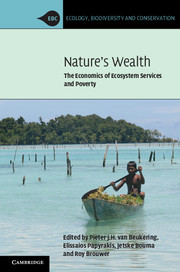Book contents
- Frontmatter
- Contents
- List of contributors
- Acknowledgements
- 1 The economics of ecosystem services and poverty
- Part I Biodiversity-related ecosystem services
- Part II Marine-related ecosystem services
- Part III Forest-related ecosystem services
- Part IV Water-related ecosystem services
- Part V Land-related ecosystem services
- Index
Part V - Land-related ecosystem services
Published online by Cambridge University Press: 05 July 2013
- Frontmatter
- Contents
- List of contributors
- Acknowledgements
- 1 The economics of ecosystem services and poverty
- Part I Biodiversity-related ecosystem services
- Part II Marine-related ecosystem services
- Part III Forest-related ecosystem services
- Part IV Water-related ecosystem services
- Part V Land-related ecosystem services
- Index
Summary
Land-related ecosystem services
Humans have always depended on land-related ecosystem services to secure survival and improve well-being. Human-induced changes in land use have typically allowed populations all over the world to expand agricultural land, food production and human settlements. Extensive deforestation and mining secured access to timber and mineral resources, which consequently facilitated increases in production and consumption. This modification of land cover, and the natural environment more broadly, for the sake of human benefit has nevertheless not always coincided with improvements in living standards and poverty alleviation. Increases in food availability at least until the Industrial Revolution were for the most part accompanied by subsequent increases in population size rather than any significant welfare improvements. More recently, structural changes favouring manufacturing and technological advancements allowed for significant productivity gains (and improvements in nutrition, life expectancy and living conditions) despite high population growth rates, at least for the more developed economies.
- Type
- Chapter
- Information
- Nature's WealthThe Economics of Ecosystem Services and Poverty, pp. 333 - 340Publisher: Cambridge University PressPrint publication year: 2013



